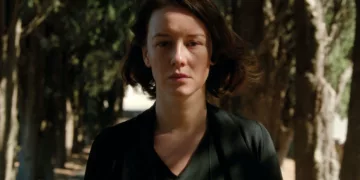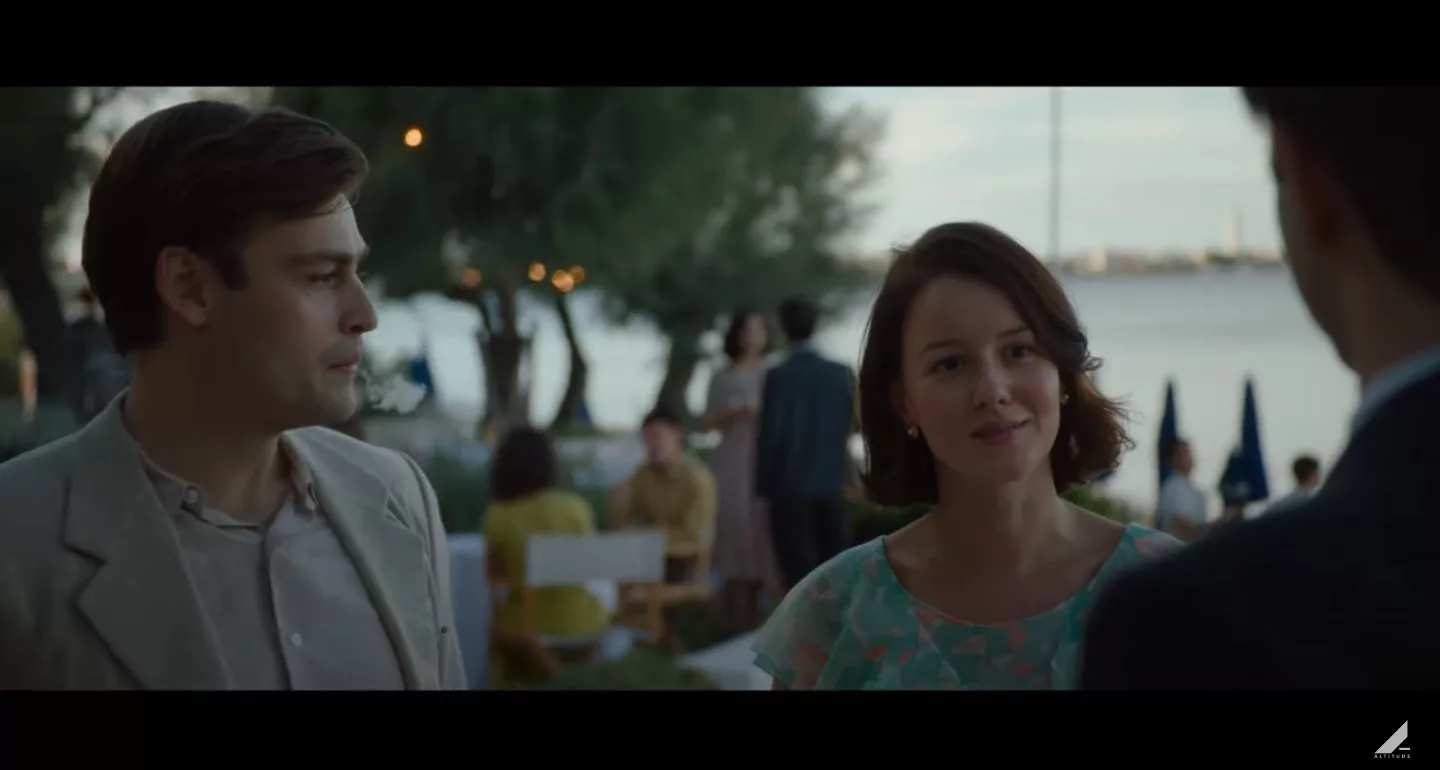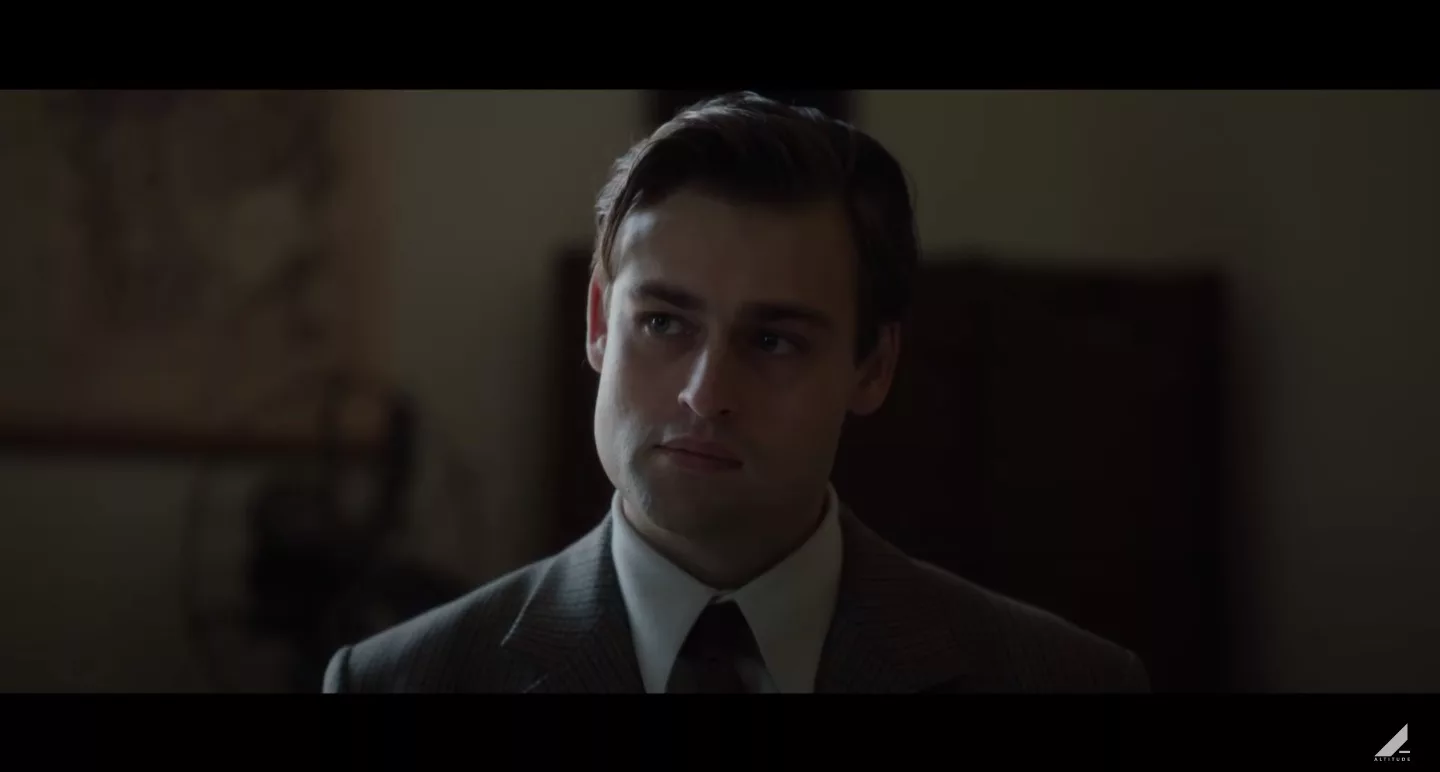Transporting viewers back to 1930s Palestine, Shoshana offers a glimpse into a turbulent period that still resonates today. Based on real events during the British mandate era, this historical drama from prolific director Michael Winterbottom centers on the ill-fated romance between a British police officer named Thomas Wilkin (Douglas Booth) and the fiery Jewish journalist Shoshana Borochov (Irina Starshenbaum).
As a member of the Zionist paramilitary group Haganah, Shoshana champions the founding of an independent Jewish state through peaceful action rather than violence. However, escalating tensions between Jewish militants like the Irgun and the ruling British authorities threaten to tear the couple apart.
Caught in the middle is Wilkin’s ruthless supervisor Geoffrey Morton (Harry Melling), who ramps up violent tactics to suppress both Arab and Jewish dissent. With bombs exploding across Tel Aviv and the future Israel spiraling into chaos, Shoshana and Wilkin struggle to reconcile political divisions with personal loyalties.
Bringing a pivotal chapter of the Israel-Palestine conflict to life, Winterbottom tackles the complex roots of today’s geopolitical tensions through an intimate lens. Shedding light on inner Jewish politics and barely glimpsed perspectives, Shoshana promises to be an eye-opening ride for history buffs and romance fans alike.
Love and Betrayal in Tumultuous Times
At its core, Shoshana is a tale of star-crossed lovers torn between personal and political loyalties. Despite their opposing allegiances, defiant journalist Shoshana and conflicted British officer Wilkin are drawn together in a dangerous romance that cuts against the grain.
Firebrand Shoshana is a feminist trailblazer, boldly flouting convention as a gun-toting reporter and paramilitary member. She fights for her people’s independence, steadily advocating for a peaceful path to statehood. Yet her Haganah comrades pressure her, while the violent tactics of rival militant Avraham Stern horrify her.
As Shoshana’s British beau, Wilkin starts out a fish-out-of-water idealist enchanted by her and Tel Aviv’s promise. While his ruthless boss Morton crushes dissent through cruel measures, Wilkin aims to keep order through understanding. He masters Hebrew, connects with locals, and pleads for policy changes, striving to secure stability without oppression.
But as chaos mounts and allegiances blur, Wilkin’s principles and relationship come under fire. With Stern terrorizing Arabs and Brits alike, Morton ramps up retaliation by any means necessary. Meanwhile, Zionist factions unite against the British despite decades of bitter infighting. As body counts rise across Tel Aviv’s bullet-riddled streets, both lovers face wrenching choices between their duty and devotion.
Deeply humanizing these iconic figures, Shoshana unravels their inner conflicts while contextualizing their impossible decisions. Far from stereotypes, Shoshana, Wilkin and even Morton emerge as complex souls trapped by imperialism’s long shadow.
Immersing Us in Historic Tel Aviv
Transporting audiences back in time, Shoshana boasts top-notch technical artistry in recreating 1930s Tel Aviv under the steady gaze of cinematographer Gilles Nuttgens. Filmed on location in Italy’s Apulia region, the production design by Sergio Tribastone convincingly doubles for mandatory Palestine’s coastal crown jewel.
Nuttgen’s camerawork casts a noirish pall while spotlighting the city’s distinct architecture. As shafts of light slice through half-drawn blinds, long shadows stretch across the striking Bauhaus buildings that define Tel Aviv’s “White City” aesthetic. Period vehicles and trams roll down palm-lined boulevards between gritty, soot-stained side streets, contrasting colonial pomp with impoverished precarity.
By turns idyllic and ominous, Tribastone’s lived-in sets situate us in a society perched on a knife’s edge. Wilkin’s sparse flat and the police station’s barren bullpen reflect official austerity amid lifts playing swinging big band tunes. The urban kibbutz where Shoshana was raised oozes socialist idealism, its bare-bones bunks belying lofty communal aspirations that are fast unravelling.
From steamy love nests to blood-spattered crime scenes, Shoshana’s production design transports viewers decade deep. Seamlessly blending historic accuracy with metaphoric resonance, Nuttgens and Tribastone fully immerse us into the world of 1930s Tel Aviv as both Shoshana’s haven and prison.
Navigating Complex Politics and History
Steeped in the complex politics of 1930s Palestine, Shoshana attempts to parse competing perspectives amid a still-polarizing period. While avoiding simplistic heroes and villains, the film explores provocative themes around resistance and retaliation, imperialism and independence.
At its heart, Shoshana is an anti-colonial story, sympathetic to Jewish self-rule while confronting violent roads to statehood. As with real figures like Shoshana and Stern, the film recognizes Zionists’ quest for autonomy, yet balks at militant means that spawn endless cycles of bloodshed. Alongside the Jewish fighters, the British too are humanized yet implicated, their overtures to stability undergirded by forcibly upheld power imbalances.
By homing in on interpersonal relationships, Winterbottom unearths insights into intercommunal dynamics driving divisiveness today. But in spotlighting Jewish and British roles, the film risks further sidelining Palestinian perspectives in their own homeland’s history.
Beyond politics, Shoshana strives for authenticity through events and era details that reveal escalating tensions. However, some call out the exaggerated contrast between Wilkin’s naïve idealism and Morton’s sneering sadism as heavy-handed. Moreover, the glossy leads’ muted chemistry downplays the high personal stakes, while the blaring score and sporadic dance numbers clash with the solemn setting.
Nonetheless, Shoshana’s rich social textures and cogent encapsulation of clashing motivations mark a meaningful, if imperfect, historical exploration. Illuminating pivotal crossroads on the road to two modern states perpetually at odds, the film succeeds more as a conversation starter than a definitive take.
A Mixed Bag of Moods and Rhythms
As a historical thriller-drama hybrid, Shoshana aims to balance action intrigue with romantic depth against a weighty backdrop. This juggling act yields a somewhat uneven mix of pacing and tones that may alternately grip or lose viewers along the way.
After an exposition-heavy start, the film settles into almost episodic vignettes as Wilkin and Morton pursue Stern through police procedural plots. Parallel sequences build tension around the Irgun’s next bombing target but lack strong connective tissue in the interim. However, the second act picks up steam as relationships and subplots converge for a propulsive climax.
Thematically, the story’s shifts between sweeping political treatise, sexy melodrama, and gritty potboiler don’t fully coalesce either. The score strikes spy-movie riffs during domestic squabbles before blaring dance pop over graphic violence, undercutting gravity. Starshenbaum has a luminous presence, yet Shoshana seems sidelined halfway through, an odd choice given the title role.
Uneven pacing and distracting tonal dissonance prevent Shoshana from realizing its ambitious vision. With some judicious editing to smooth narrative flow and reinforce thematic cohesion, the film could better honor the operatic human drama at its core. As stands, Winterbottom juggles his ingredients imperfectly but the rich ingredients still shine, making for an intriguing if messy meal.
Compelling Leads Mired by Uneven Chemistry
Led by an international cast, Shoshana banks on the trio of Irina Starshenbaum, Douglas Booth and Harry Melling to anchor this star-crossed period romance. While the central duo shows promise, lukewarm chemistry and intermittent sidelining hamper their impact.
Making her English-language debut, Russian talent Starshenbaum brings vivacious edge to fiery scribe Shoshana despite thinly sketched dimensions. Flitting from seductress to soldier, her magnetic presence recalls a young Joan Chen, skillfully pivoting from battened-down trauma to irrepressible joie de vivre between bombshells.
As gentleman officer Wilkin, Booth cuts a dashing figure seemingly airlifted from a vintage war bond poster with his toothy charm and uniform crispness. He captures Wilkin’s out-of-his-depth decency and growing disillusionment once idealism collides with ugly realities. But we’re told more about his inner conflicts than shown through awkward line readings that flatten the arc of his crisis.
By contrast, Melling shreds each scene as the merciless Morton, exuding cold calculation and obsessive drive with reptilian menace. Yet his one-note villainy highlights the protagonists’ relative weakness while bearing little resemblance to his moralistic real-life analogue.
Though miscast and underserved by thin characterization, Shoshana’s talented leads strike memorable notes whenever afforded the chance. But muddled relationship dynamics mute the intended emotional voltage, flattening out compelling figures. With surer directorial hands on the wheel, this crew could have electrified.
An Imperfect Portrait of Potent History
Though uneven in execution, Shoshana earns points for ambition in revisiting a historical crucible that still strikes nerves today. Winterbottom clearly aimed high in balancing sweeping politics with intimate passions against a tense civil unrest backdrop. And the fact that he doesn’t fully stick the landing hardly negates the merits of a noble attempt.
Ultimately the film’s reach exceeds its grasp. Jumbled pacing and inconsistent tones diffuse narrative momentum and emotional investment while glossing over Palestinian plight for more Jewish perspectives. Threads get tangled across overlapping subplots and timelines.
Yet Shoshana remains an intriguing rough sketch of explosive times, anchored by assured world-building and strong lead turns. For history buffs, it offers a visually transporting portal into mandate-era Tel Aviv’s sociopolitical crucible, illuminated by fresh faces and marginalized views. As a sweeping anti-imperial romance, it falters, but still showcases Standershenbaum’s electrifying arrival alongside a charismatic roster.
Flawed and fragmented yet full of promise, Shoshana should tickle more patient period-drama fans open to glossing over gaps with some glamorous style. If you long for a glimpse of early 20th-century Palestine beyond stone-throwing stereotypes, it’s worth overlooking the uneven finish. For a nuanced post-mortem unpacking why Mideast peace remains so elusive nearly a century on, look elsewhere. But purely as a starting point for discussion, Shoshana delivers food for thought between the missteps.
The Review
Shoshana
Despite its noble intentions to shed light on overlooked history, Shoshana’s uneven execution hampers its effectiveness as either sweeping historical drama or gripping romantic thriller. Still, vivid atmosphere and a refreshingly complex lens make it a flawed but conversation-worthy entry point into interwar Palestine’s sociopolitical powder keg.
PROS
- Strong lead performance by Irina Starshenbaum
- Transportive sense of place and time depicting 1930s Tel Aviv
- Nuanced exploration of complicated historical political tensions
- Ambitious attempt to tackle weighty themes
CONS
- Uneven pacing and disjointed narrative flow
- Lackluster romantic chemistry between leads
- Underdeveloped characters and relationships
- Historical inaccuracies and simplifications
- Lack of depth in representing Palestinian perspectives





















































